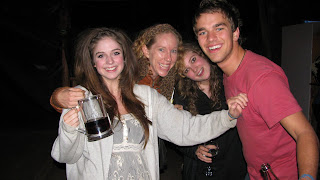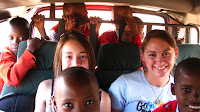Filed under the heading of “Things I Never Would Have Known About If I Hadn’t Gone to Africa” is the issue of albinos and the hardships they face in Tanzania. In addition to the usual challenges—being ridiculed for looking different, social segregation, the risk of getting sun burned, and suffering eye problems—albinos in Tanzania are in danger of being killed for their body parts.
In short, witch doctors tell people they need a leg, an arm of an albino in order to make magic potions that will bring people good luck or fortune. And quite a few albinos have been murdered in Tanzania in the past few years because people actually believe the witch doctors. I did a google search of Tanzania/albino/witch doctors, and the stories that come up are not for those who are weak of stomach.
Rose told me that the school houses about 80 albinos and most of them are fairly vision impaired. They have a Braille computer room, and the schoolmaster built an enormous hall with huge windows so the children can be protected by the sun and yet still feel like they are playing outside.
In a country where many people believe that being born albino is the result of a curse that was put on your family, the Mwereni School is a place where the students become each other’s family. I love that such a school exists, and I love that young people like my friends Rose, Josh and Vanessa choose to spend their summers helping students learn English so they can have a stab at some kind of successful future.

This is Vanessa, Theresa, Rose and Josh. In addition to being great English teachers, they can shake their groove thing on the dance floor too.
























